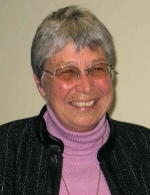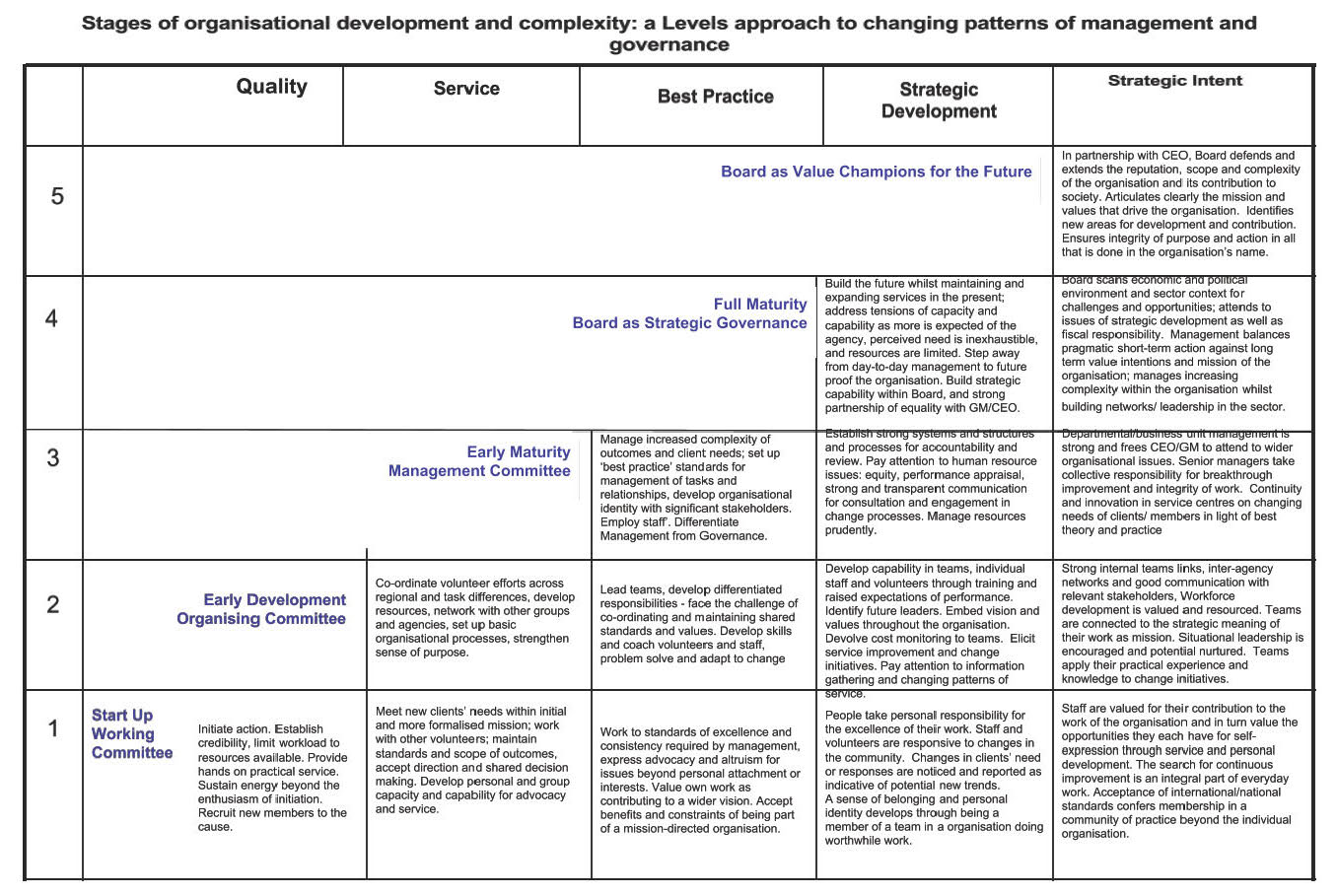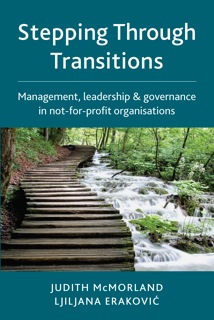 |
Dr. Judith McMorland |
Written Resources
Case study:
A New Zealand not-for-profit organisation– an evolutionary and Levels of Work perspective on the emergence of governance/management relationships
Book Reviews by Society Members: Stepping through transitions
James Rice, Ph.D., Professor Emeritus, School of Social Work, McMaster University, Canada:
“Stepping Through Transitions is a compelling “how to” book for people in the non-profit sector. We need new ways of carrying out systems analysis and thinking through how to manage complex organisations. One example of the challenge facing non-profit organisations is getting the balance right between the ability of board members and the ability of the executive director. Boards members often find themselves in conflict with their Executive Director (and vice versa) because they do not have a shared understanding of the underlying complexity of the problems facing the organisation. These types of challenges present a real problem in non-profit organisations. And this book provides a useful framework to diagnose and work on this problem.
The book’s five stage developmental framework provides an interesting and useful way to facilitate a good board and staff discussion about the organisation’s birth, history and story. There are enough stories and examples to help you design and lead such a session to align views and values.
The authors draw upon a wide scholarly literature which provides a solid base for a writing style that is engaging and easy to relate to. People from a wide spectrum in the non-profit sector will find the material informative and useful in analysing how well their organisation is performing. The stories and examples laced throughout the book will help readers connect to the process and understand the challenges facing them as they map the path of their own organisations.
The book is a ‘must read’ for those who want to take on this challenge.
This review is shaped by my experiences as a Professor of Social Work, author of a book on Canadian social policy and 25 years of involvement in non-profit organisations as a volunteer, founding president, board member, national president, and consultant to numerous executive directors and boards.” Professor Rice is a co-author of Changing Politics of Canadian Social Policy. He is the Founding chair of the East Hamilton Community Services organisation and National President of the Boys and Girls Clubs of Canada. He is also a consultant to numerous common good organisations.
Professor Gillian Stamp, MA, PhD, D Phil, FRSA. Director, BIOSS International, Fellow of the Windsor Leadership Trust, UK:
“I admire the ways the authors have woven together different ways of thinking. To identify stages of development and levels of work and then to combine in levels of complexity and the 5Cs, as the authors do, creates a rich model. Their CGO Development model has such value for common good organizations, and has a great deal to offer to organisations in other sectors as they seek sustainability. This book deserves as wide a readership as possible.”
Rick Beauchamp, LLM, MSW, BA(Hons) RFB Associates, Management Consulting & Organizational Development. Hamilton, Ontario, Canada:
“Stepping Though Transitions is a unique and comprehensive assessment of critical factors associated with the development and growth of non-profit organizations (referred to as common good organizations, or “CGOs” by the authors.) Through their extensive research efforts, the authors have acquired a deep understanding of the main strengths and challenges facing CGOs, whether in social services, the environment, health, the arts or other sectors.
This book will be of great utility to organizational leaders (and aspiring leaders) at both governance and managerial levels in not-for-profit agencies. Multiple case scenarios are offered to ground these challenges in practical ways. While the case studies are confined to experiences in New Zealand, they are readily applicable to non-profit organizations anywhere. Considerable time is devoted to exploring new, fledgling organizations that are reliant solely on volunteers. However, the authors also examine small to medium-sized organizations operating at more sophisticated levels as well.
Managers and senior executives will benefit from gaining a clear sense of the developmental issues and associated tasks facing non-profit agencies as they adapt and grow. Board governors should develop comprehensive insights as to the nature of their particular leadership challenges and the issues which must be addressed to ensure organizational sustainability. I was intrigued by the authors’ challenge of the Carver governance model, long relied upon in the non-profit world. While the Carver model advocates a strong separation between governance and management functions, the authors argue that a stronger “partnership” between CEOs and Boards is necessary. As they caution, however, a corollary to this is the requirement for relatively equal levels of capacity and capability at both the CEO and Board level. In other words, the ability to think strategically, be comfortable with handling ambiguity and complexity, have the ability to work well with others and have an abiding passion for the mission and intent of the organization is necessary at both the board and executive levels.”
Jerry L. Gray, Ph.D. Dean Emeritus and Senior Scholar, I.H. Asper School of Business, University of Manitoba, Winnipeg, Manitoba, Canada:
"This book would be an excellent read for both experienced and inexperienced individuals involved in the CGO sector. Using the rear view mirror, one can see how mistakes were made, and looking forward, the book can help anticipate and manage the transition phases. Readers will find this a refreshing insight into the workings of CGO’s."
Click here for more reviews
Non-for-profit / Common good organizations Judith has consulted for:
- Auckland Consortium for Theological Education
- Bowls NZ
- Catholic Diocese of Auckland
- cbm
- Challenge Trust
- Family Planning
- Focus 2000
- Human Rights Foundation
- IOSIS
- IRIS
- Leprosy Mission of NZ
- NZ Private Physiotherapists Association
- New Zealand Aids Foundation
- NZ Society of Physiotherapists
- Plunket Society
- World Vision






